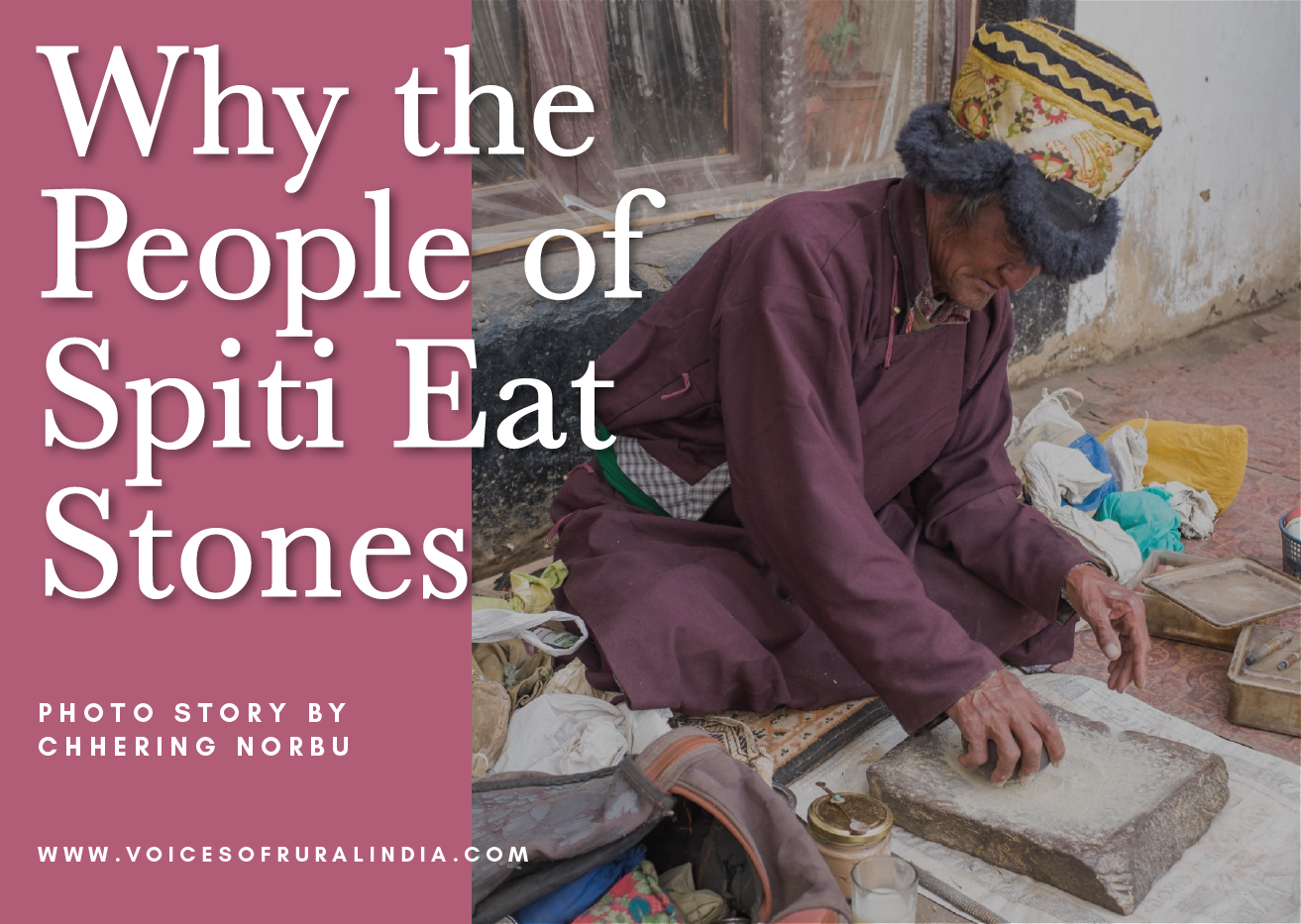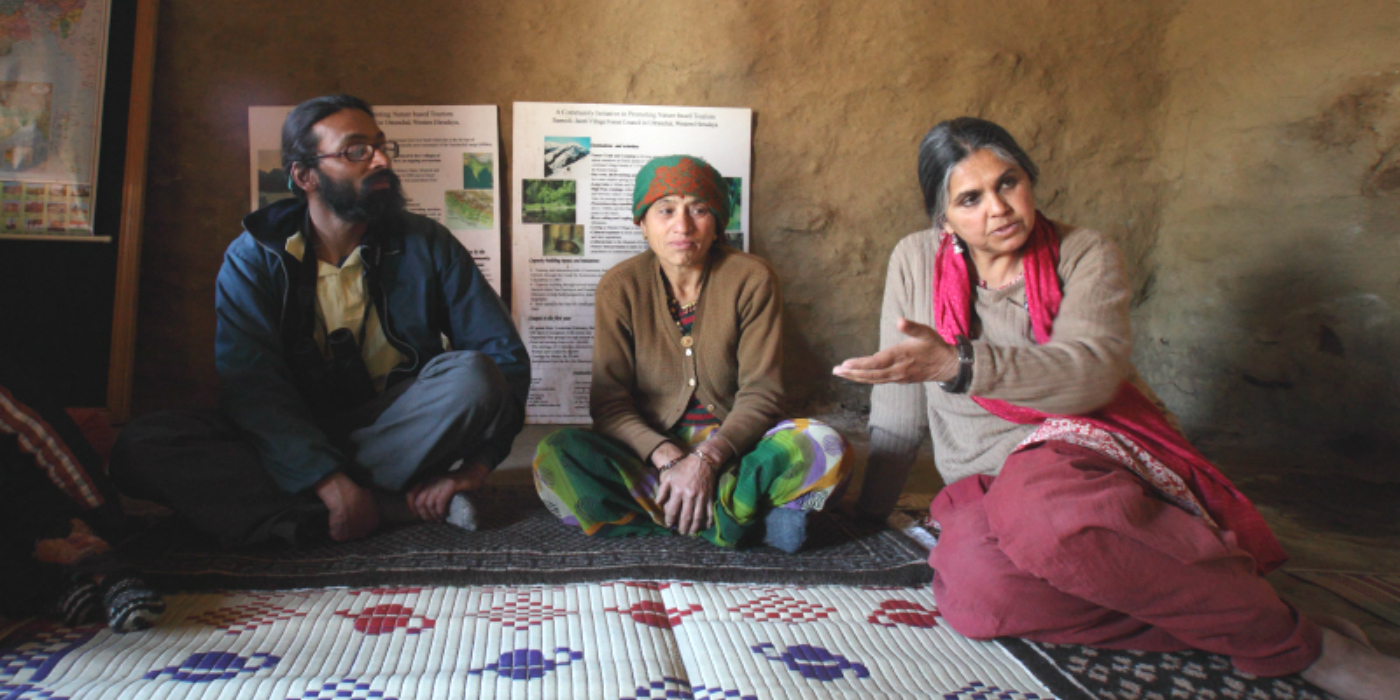
Malika Virdi, Mountaineer, Farmer & Sarpanch of the Sarmoli-Jainti Van Panchayat (Munsiari) and Director of Himalayan Ark
Malika Virdi moved to Sarmoli village in Uttarakhand over two decades ago to make a life close to the land and its people in this remote part of the Greater Himalaya. As an active member of a mountain village community, she seeks to deepen the connect with wildernesses with enough room to move and be moved. She is currently in her second term as the Sarpanch of the Sarmoli-Jainti Van Panchayat and likes to call herself a subsistence farmer. She started Himalayan Ark, which is a community-led tourism initiative in the Greater Himalaya and supports homestays owned and run by the local mountain women. Edited excerpts from an interview:
Q: How is Himalayan Ark linking tourism, with conservation and livelihoods?
Malika: We have come to where we are after a series of transitions. Sarmoli is a mountainous Himalayan village in Munsiari, very close to the Nepal and Tibetian trijunction in the Gori Valley. It is a very unique, beautiful and scenic place with snow capped Panchachuli mountain range right across the valley. The community is largely forest dependent, so is our agriculture and lifestyle.
While there is dependence, there is a traditional system and commons arrangement that was symbiotic. The forests are used and conserved as a common pool resource. However, people had slowly stopped really investing in the forest commons because markets had come up: “Gas hai, aise hi khana pakalenge, lakdhi kaun kat ke layega?”
In 2003, I was elected as a sarpanch and I would try and motivate people in conserving our forest. But the response was lukewarm and inadequate as their dependence for their livelihoods on the natural resource base had weakened over time. That’s when we figured that if you want to work on conservation issues you cannot forget livelihood issues.
We zeroed in on the homestay initiative in 2004. We opened it up for the entire community. Anyone who is a right holder in the Van Panchayat or the village forest commons can volunteer and become part of the tourism enterprise but on the condition that they give time, do voluntary labour, chawkidari, attend meetings and engage in management. If they are proactive in conservation, only then can they join the enterprise and homestay. We began with 13 families out of the 300 right holders and then grew to 25.
We realised soon as the enterprise grew that it has to be a business entity. It evolved into what it is now—a responsible tourism enterprise working with nature and culture in the mountain community. Now we call ourselves Himalyan Ark. Currently in our village, Sarmoli, we have 18 registered homestays and there are some in six other villages but not as active as in Sarmoli.
Over time, we realised that while we say that we are a responsible tourism enterprise we have to be responsible to not just a set of principles we have evolved for ourselves but also a larger ethos in the present tourism industry. We are registered with District Tourism Development Office for mutual benefit, as they can claim our success is their success and we can have a voice in policymaking and provide a direction in homestay statutory evolution. The Uttarakhand government has an aggressive Home Stay policy and it is very important that we have a say in the government policy.
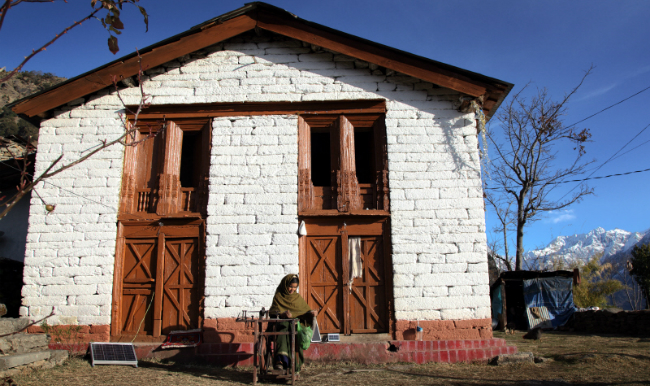
Q. What sets the Himalayan Ark homestay apart?
Malika: As people are travelling to newer places, hotels provide a jaded experience. Except for a good hospitatly and views, hotels don’t really provide a sense of the place and the people. A lot of tourists reach out to us for this reason. It is important for us to set the expectations correctly while visiting a homestay. We are very particular in explaining to travellers that they are going to be a guest of a family in a village home, where they will be looked after with warmth and care. They are entering somebody’s private place and they need to be considerate and have some amount of sensitivity. A guest is encouraged to come with an open mind and to be aware that their Vyavahaar (behaviour) is their parichay (an introduction to who you are). .
We do the guest-host match in a manner that would be beneficial for both. Guests don’t order for food; they are served three meals and just like in any family home dietary requirements or taste preferences are taken into consideration.
Another thing we ask the guest to expect is a hot breakfast and dinner, and a packed lunch so the women of the house are free to do their day’s work as it is not possible for them to entertin guests through the day. Instead, we welcome guests to join us in our everyday lives. She is the owner and you are her guest, she should be free to follow her work rhythm. In the evening, after you come back there will be tea and hot pakodas and then dinner. This way a different relationship of mutual respect and sharing is formed than if you stayed in a hotel.
You are actually a guest of the village community. Now that is easier said than done, because in our village there are 300 families and only 18 run homestays. We make sure that the guest feels welcome in the village. During a walk around the village, we encourage villagers to interact. For community events, we invite everybody in the village so there’s a sense of camaraderie and co ownership. If the guests want a guided tour of the village, the farms or the forest, then other families pitch in so that they can also benefit. This supports the other families.
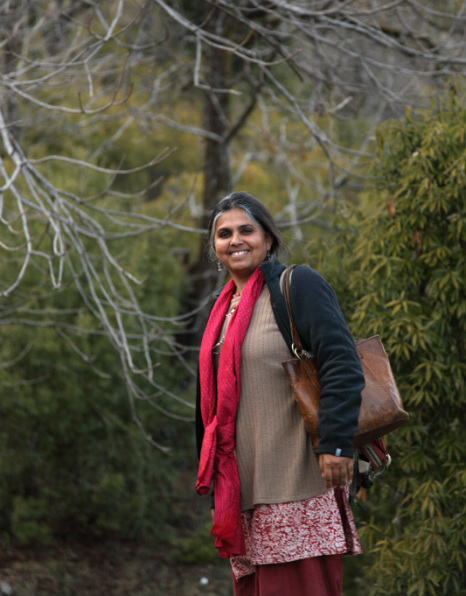
Q. What challenges have you faced In establishing and running Himalayan Ark?
Malika: One of the challenges is this misconception that a village homestay should be cheap. Homestays are not cheap stays, they are alternative accommodation. It is a culturally immersive experience, staying closer to nature with locals who know the place like the back of their hand. It’s an experience where tradition, knowledge and culture, all come together. The challenge is to explain what a homestay experience truly is.
At a practical level, working in a group is not always easy. The market pressure can be hard, sometimes people breakaway from the community homestay model, thinking why should they wait for their turn to host. They might want to become independent hosts and get their own guests. But if something goes wrong in one homestay, the whole village gets impacted and suffers. That culture of maximizing personal gain over community well being is seeping into villagers as well. When there is a collective, it gives the broad majority security and a voice. Then the market can’t take over our interest.
Though the government is saying they want to support homestays, infrastructure continues to be a challenge. There are issues with connectivity/internet, roads are not well maintained, ATMs don’t work, and guests can’t use credit cards here etc. These infrastructural facilities need to be set up and secured by the government to make the last mile connectivity function efficiently. It is only then that it is possible for rural home stays to become a success.
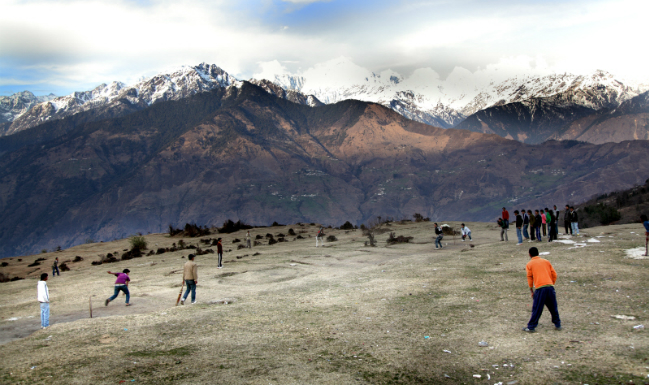
Q. Please share your proven best practices that other RT practitioners could implement.
Malika:
1. Responsible tourism has to look at all the moving parts of the industry. Thumb rule is to keep the community, landscape, and guests—at the centre. Tourism cannot operate at the cost of other things happening in our land. Balance is important. If a place becomes just a tourist destination then it goes down the drain. If it remains a community, where visitors come but don’t take over the landscape then it is responsible tourism.
2. Be mindful of the scale and manner in which resources of the landscapes like water, the land and forest being used for tourist needs. Hosts too need to be responsible and not just give in to tourist demands, at the cost of depriving the local or their access to the same resources.
3. Keep the lives and stories of people in the community as primary and pivotal to the tourist experience.


